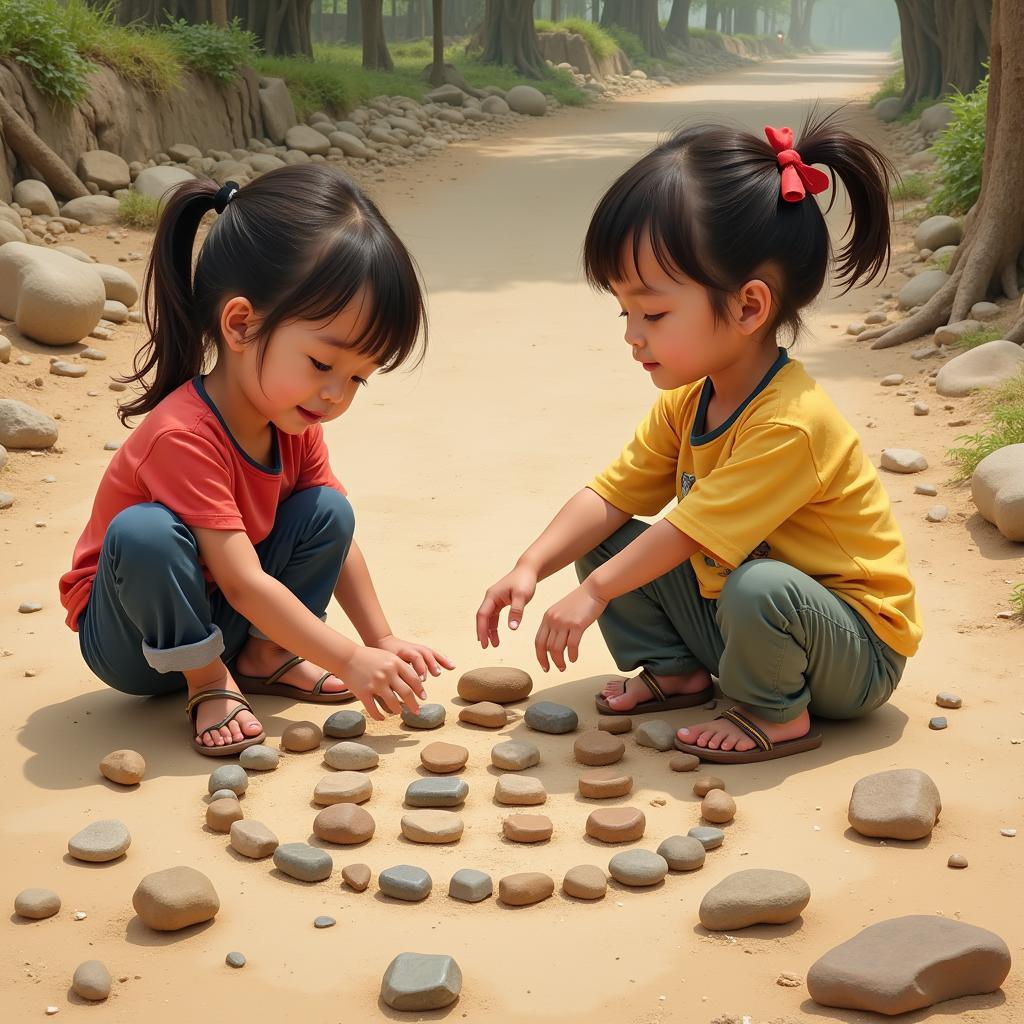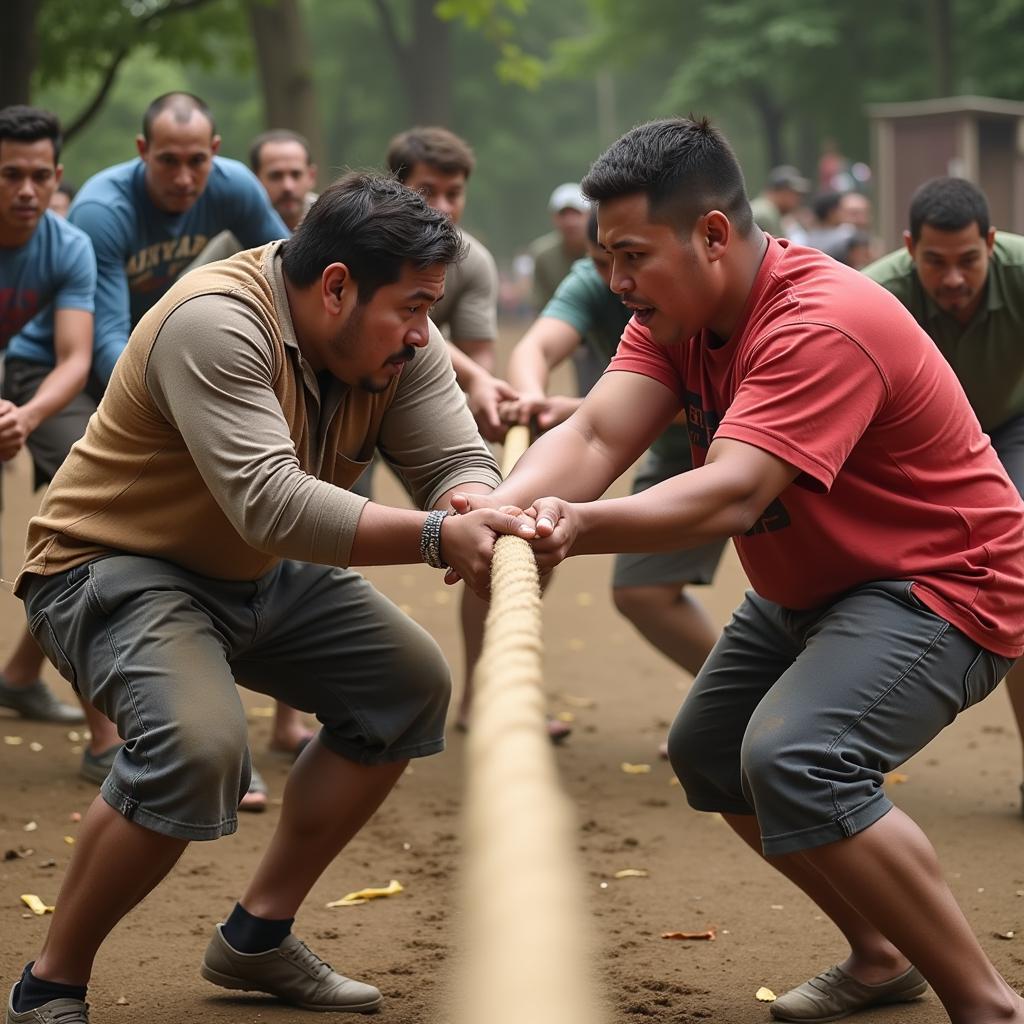Traditional Vietnamese games offer a fascinating glimpse into the rich cultural heritage of Vietnam. These games, often played during festivals and celebrations, are not only fun but also promote community bonding and physical activity. This article will explore various popular traditional Vietnamese games, explaining their rules and cultural significance in English.
Discovering the Fun of Vietnamese Folk Games
Traditional Vietnamese games, known locally as “trò chơi dân gian,” are a vibrant part of Vietnamese culture. Passed down through generations, these games offer a unique blend of entertainment, skill, and cultural significance. From simple games played with readily available materials like stones and sticks to more elaborate ones requiring specific equipment, there’s a game for everyone. These games are more than just child’s play; they reflect the values and traditions of Vietnamese society.
Popular Traditional Vietnamese Games and Their English Names
Many traditional Vietnamese games have direct English translations or descriptive names that capture their essence. Let’s explore some of the most beloved ones:
- Ô Ăn Quan (Mandarin Square Capturing): This strategic board game involves capturing stones by moving them around a grid. It’s a test of planning and quick thinking.
- Nhảy Dây (Jump Rope/Skipping Rope): A simple yet enjoyable game enjoyed by children worldwide, jumping rope in Vietnam often involves singing rhymes and performing tricks.
- Đá Cầu (Shuttlecock Kicking): Players use their feet, knees, chest, or head (excluding hands) to keep a weighted shuttlecock airborne. It requires skill, agility, and coordination.
- Chi Chi Chành Chành (Hand Clapping Games): These games involve rhythmic hand-clapping and singing, often accompanied by rhymes and playful gestures. They are excellent for developing hand-eye coordination and rhythm.
- Bịt Mắt Bắt Dê (Blind Man’s Bluff): One player is blindfolded and tries to catch the others, adding an element of suspense and laughter.
- Kéo Co (Tug of War): This classic game tests strength and teamwork as two teams pull on a rope, trying to drag the other across a center line.
 O An Quan Gameplay
O An Quan Gameplay
The Cultural Significance of Trò Chơi Dân Gian Việt Nam Bằng Tiếng Anh
Understanding traditional Vietnamese games in English allows for a broader appreciation of Vietnamese culture. These games reflect the resourcefulness and creativity of the Vietnamese people, often using simple materials found in nature. They also emphasize community and social interaction, fostering cooperation and sportsmanship. Learning about these games provides valuable insight into the history, traditions, and values that shape Vietnamese identity.
Learning about Vietnamese Culture Through Play
Traditional Vietnamese games are an integral part of festivals and celebrations, adding to the festive atmosphere and bringing people together. They are often played during Tết (Lunar New Year) and other special occasions, strengthening family bonds and creating lasting memories. By participating in or observing these games, one can gain a deeper understanding of Vietnamese cultural practices and the importance of community.
“Traditional games are a window into the soul of a culture,” says Dr. Nguyen Thi Lan, a prominent Vietnamese anthropologist. “They reveal the values, beliefs, and social dynamics of a community.”
Preserving Tradition in a Modern World
While modern technology and entertainment options are readily available, traditional Vietnamese games continue to hold a special place in the hearts of many. Efforts are being made to preserve and promote these games, ensuring that future generations can experience the joy and cultural richness they offer. Schools and community centers often organize traditional game events, reminding younger generations of their heritage.
 Tug of War Competition
Tug of War Competition
Conclusion: Embracing the Legacy of Traditional Vietnamese Games
Traditional Vietnamese games, described in English as “Vietnamese folk games,” provide a unique and engaging way to connect with Vietnamese culture. From Ô Ăn Quan to Kéo Co, these games offer entertainment, promote physical activity, and foster social bonds. By learning about and playing these games, we can help preserve a valuable cultural heritage and appreciate the rich traditions of Vietnam. Remember, understanding “Các Trò Chơi Dân Gian Việt Nam Bằng Tiếng Anh” opens a door to a vibrant cultural experience.
FAQ
- Where can I learn more about the rules of these games? Many resources are available online and in libraries. You can also ask Vietnamese communities for guidance.
- Are these games only for children? While many are enjoyed by children, some, like Đá Cầu and Kéo Co, are also popular among adults.
- What is the best time to play these games? They are often played during festivals and celebrations, but you can enjoy them anytime.
- What are the benefits of playing these games? They promote physical activity, social interaction, and cultural understanding.
- Are there any variations in the rules of these games across different regions of Vietnam? Yes, some regional variations exist, adding to the diversity of these games.
- Can I buy equipment for these games online? Yes, many online retailers sell equipment for games like Đá Cầu and Ô Ăn Quan.
- Are there any organizations dedicated to preserving traditional Vietnamese games? Yes, several cultural organizations and community groups work to promote and preserve these games.
“These games are not just about winning or losing,” shares Mr. Pham Van Minh, a respected community elder, “they are about connecting with our past and building stronger communities.”
More Questions to Explore:
- How do traditional Vietnamese games compare to games from other Southeast Asian countries?
- What role do traditional games play in educating children about Vietnamese history and culture?
- How have traditional Vietnamese games evolved over time?
Need assistance? Contact us 24/7: Phone: 0968204919, Email: [email protected] or visit us at: Tổ 9 Ấp, Tân Lễ B, Tân Thành, Bà Rịa – Vũng Tàu 790000, Vietnam.